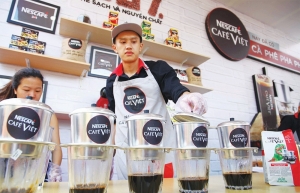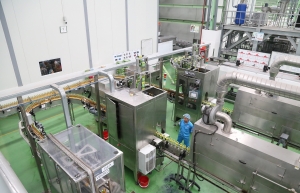F&B still attractive for players old and new
 |
| This year, Phuc Long is implementing new strategies in order to not fall behind its competitors |
In the race to attain popularity among customers, The Coffee House has surpassed Phuc Long, the second-largest coffee and beverage chain in terms of network size in Vietnam, according to a list of the top 10 most reputable food and beverage (F&B) companies on social networks, published by monitoring group Reputa in early February.
According to Reputa, The Coffee House made an impressive comeback in the second half of last year through various promotions, while Phuc Long was downgraded by one notch compared to 2022.
The rankings of F&B businesses are being affected after a year of wider economic fluctuations. Fast food chain KFC Vietnam continues to lead the rankings for the second year in a row thanks to constantly implementing promotions every month, successfully gaining interaction and engaging fans and the community at large on social media.
Phuc Long, meanwhile, is trying to regain its position in the rankings. According to a report by Masan Group, which owns 85 per cent of Phuc Long shares, the beverage brand experienced a relatively difficult year in 2023 with revenue reaching about $64.7 billion, down nearly 3 per cent compared to the previous year.
Masan has announced plans to open 30-60 new flagship stores and kiosks in Hanoi and Ho Chi Minh City, bringing the total number of stores to nearly 300. By innovating the menu since the end of last year and continuing to open new stores, Masan expects to bring Phuc Long to an on-year growth rate of between 17 and 41 per cent, and increase this year’s revenue to as much as $93 million.
According to the forecasts from German online platform Statista, Vietnam’s F&B market is estimated at a value of $96.5 billion in 2023, an increase of 9 per cent compared to 2022. It is expected to maintain an average annual growth rate of about 8 per cent annually heading towards 2027.
According to data from Payoo, the F&B sector had impressive growth in the second half of 2023, with an increase of about 20 per cent in the second half of the year compared to the first half.
The potential of an open market has made F&B an attractive field with exciting activity from new brands, both domestic and foreign.
In the middle of last year, new-gen tech coffee chain Révi Coffee & Tea, established by two Vietnamese founders, entered the market and quickly developed eight stores located in high-end office buildings in Hanoi and Ho Chi Minh City.
Révi calls itself the first non-cash cafe in Vietnam, and focuses on developing customer experiences and partner services via digital platforms. The company has raised capital from Singapore-based TNB Aura fund, along with domestic investment funds and organisations such as Touchstone Partners and AiViet Venture.
Without revealing specific capital numbers received from foreign funds, Révi marked the return of foreign capital to the Vietnamese coffee market for the first time since 2015, when The KAfe received $5.5 million from Cassia Investments.
In the last months of 2023, Cotti Coffee, the second-largest coffee chain in China, also entered the market by opening three stores. This year it aims to have nine new stores, focusing on Vietnam’s two biggest cities.
“The competition in the F&B industry in 2024 will become increasingly fierce, as customers tend to be highly differentiated, and a large group of customers will only choose products when they find them convenient and profitable,” said Vu Thanh Hung, CEO of café management solutions provider iPOS.vn.
Hung added that rising incomes each year and advances in IT will give birth to new products or experiences that will make 2024 a bright year for the market.
“However, 2024 will not only be about competition among domestic businesses. International chains will strongly penetrate the Vietnamese market, making the market increasingly diverse and full of interesting unknowns,” he said.
According to Momentum Works, Vietnam’s F&B market is currently ranked third in the region, with a scale of about $570 million - higher than Singapore, Malaysia, and the Philippines.
Three out of five top modern beverage chains in Vietnam - Trung Nguyen Legend, The Coffee House, and Phuc Long - are owned by domestic businesses.
According to iPOS, the Vietnamese coffee chain market is fragmented, as big brands such as Highlands Coffee and The Coffee House are still persistently expanding their chains. However, brands that are creating buzz such as Phe La and Katinat also want to gain market share.
Phe La is a domestic milk tea brand launched in 2021 and has quickly developed 26 stores in five cities. Although it was born in the context of a pandemic, it has thrived due to a diverse and creative drink menu, a design space suitable to young people’s tastes, and a business strategy focusing on the core product of Dalat Oolong tea, typically only available for export.
Meanwhile, the Katinat coffee chain has been in the market for 10 years, mainly in Ho Chi Minh City and other southeast provinces.
Since 2021, Katinat has continuously expanded and now boasts 50 stores, with some now in the Hanoi market. It prides itself on flexibility to keep up with youth trends on social networking platforms, and offers suitable space for taking check-in photos.
What the stars mean:
★ Poor ★ ★ Promising ★★★ Good ★★★★ Very good ★★★★★ Exceptional
Related Contents
Latest News
More News
- A golden time to shine within ASEAN (February 19, 2026 | 20:22)
- Vietnam’s pivotal year for advancing sustainability (February 19, 2026 | 08:44)
- Strengthening the core role of industry and trade (February 19, 2026 | 08:35)
- Future orientations for healthcare improvements (February 19, 2026 | 08:29)
- Infrastructure orientations suitable for a new chapter (February 19, 2026 | 08:15)
- Innovation breakthroughs that can elevate the nation (February 19, 2026 | 08:08)
- ABB Robotics hosts SOMA Value Provider Conference in Vietnam (February 19, 2026 | 08:00)
- Entire financial sector steps firmly into a new spring (February 17, 2026 | 13:40)
- Digital security fundamental for better and faster decision-making (February 13, 2026 | 10:50)
- Aircraft makers urge out-the-box thinking (February 13, 2026 | 10:39)





 Tag:
Tag:













 Mobile Version
Mobile Version